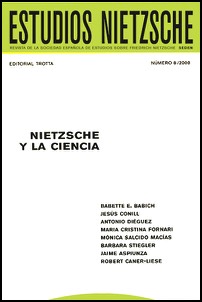The Young Nietzsche and Science: the Democritus’ Case
DOI:
https://doi.org/10.24310/EstudiosNIETen.vi8.10284Keywords:
science, rationalism, intuitionAbstract
The young Nietzsche introduces Democritus as the first absolute incarnation of scientism and rationalism. How can we understand this in tune with Nietzsche’s criticism of scientific optimism and of rationality in general? How can we understand Nietzsche’s suggestion that the rationalistic Democritus is no more the summit of Greek thought, but Heraclitus, that kind of «intuitive man»? When intending to bring to the fore the knot that links these texts beyond their apparent contradiction, we would like to contribute to the revaluation of Nietzsche’s reception of pre-Platonic philosophers.
Downloads
Metrics
References
Barrios Casares, M., Narrar el abismo. Ensayos sobre Nietzsche, Hölderlin y la disolución del clasicismo, Valencia: Pre-textos, 2001.
Camus, Albert, El mito de Sísifo, trad. de E. Benítez, Madrid: Alianza, 1999.
I. Kertész, I., Diario de la galera, trad. de A. Kovacsics, Barcelona: Acantilado, 2004.
Kertész, I., Fiasco, trad. de A. Kovacsics, Barcelona: Acantilado, 2003.
Kertész, I., Kaddish por el hijo no nacido, trad. de A. Kovacsics, Barcelona: Acantilado, 2001.
Kertész, I., Sin destino, trad. de J. Xantus, Barcelona: Acantilado, 2001.
Kertész, I., Un instante de silencio en el paredón. El holocausto como cultura, trad. de A. Kovacsics, Barcelona: Herder, 22002.
Kertész, I., Yo, otro. Crónica del cambio, trad. de A. Kovacsics, Barcelona: Acantilado, 2002.
Kisiel, Th., The Genesis of Heidegger’s Being & Time, Los Angeles: University of California Press, 1993.
Kundera, M., El arte de la novela, trad. de F. de Valenzuela y M. V. Villaverde, Barcelona: Tusquets, 2000.
L. Földényi, «Der Identitätslose und sein Ich. Zehn Begriffe für ein Kertész?Wörterbuch», Du, nº 757 (2005), p. 42.
M. Merleau-Ponty, M., Notes de course 1959-1961, París: Gallimard, 1996.
Mann, Th., «Sangre de Welsungos», en La voluntad de ser feliz y otros relatos, trad. de R. Sala. Barcelona: Alba, 2001
Nietzsche, F., Obras Completas, I-IV (OC ). Director ed. Diego Sánchez Meca. Madrid: Tecnos, 2011-2016
Nietzsche, F., Correspondencia I-VI. (CO). Director ed. Luis E. de Santiago Guervós. Madrid : Trotta, 2005- 2012.
Nietzsche, F., Fragmentos Póstumos I-IV (FP). Director ed. Diego Sánchez Meca. Madrid: Tecnos, 2006-2010.
Sánchez Meca, D., Nietzsche. La experiencia dionisiaca del mundo, Madrid: Tecnos, 2005.
Downloads
Published
How to Cite
Issue
Section
License
As of issue 21 (2021) this journal is published only in open access (diamond route).
From that number 21, like the previous numbers published in NIETZSCHE STUDIES, they are subject to the Creative Commons Acknowledgment-NoComercia-ShareIgual 4.0 license, the full text of which can be consulted at <http://creativecommons.org/licenses/by-nc-sa/4.0 >
It is the responsibility of the authors to obtain the necessary permissions of the images that are subject to copyright.
This work is licensed under a Creative Commons Attribution-NonCommercial-ShareAlike 4.0 International License.
Copyright generates two different rights: moral rights and patrimonial rights that EJFB recognizes and respects. Moral rights are those relating to the recognition of the authorship. They are rights of a personal nature that are perpetual, inalienable, unseizable and imprescriptible as consequence of the indivisible union of the author and his/her work.
Patrimonial rights are those that can be derived from the reproduction, distribution, adaptation or communication of the work, among others.







11.png)
